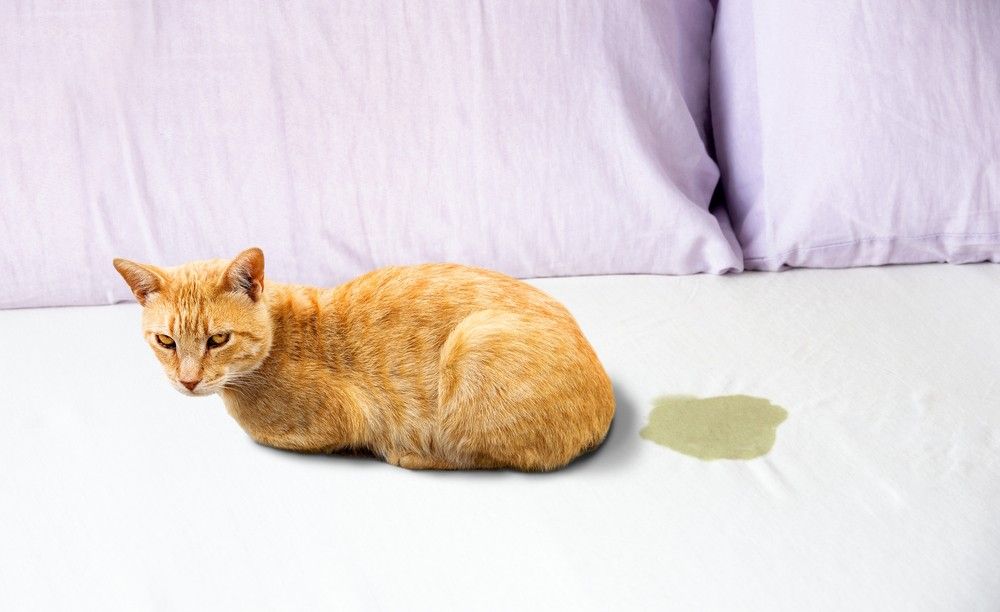If your cat is peeing on your bed, it can be a frustrating and confusing experience. You might wonder, “Why does my cat keep peeing on the bed?” or “Why is my kitten peeing on my bed all of a sudden?” You’re not alone in dealing with this issue. Many cat owners face this problem, and the reasons for it can range from medical to behavioral. In this article, we’ll cover why your cat might be doing this and what you can do to stop it.

Why is My Cat Peeing on My Bed?
There are several reasons why your cat could be peeing on your bed. Before getting too frustrated, it’s important to understand what’s causing the behavior. Here are the most common reasons:
1. Medical Issues
The first thing to consider is whether your cat has a medical problem. Cats often pee outside the litter box if something is wrong with their health. A urinary tract infection (UTI), kidney issues, or bladder stones could cause pain or discomfort when they pee. If your cat associates the litter box with pain, they may avoid it and choose a soft spot like your bed.
If your cat has suddenly started peeing on the bed, a trip to the vet should be your first step. Your vet can check for medical conditions and prescribe treatment if needed.
2. Stress and Anxiety
Cats are sensitive to changes in their environment. A stressed or anxious cat may start to pee on your bed as a way to cope. Major changes, like moving to a new home, introducing a new pet or baby, or even a change in your schedule, can make a cat feel stressed.
Your bed smells like you, so your cat may pee there to comfort themselves. If you think stress is the cause, try to make your cat feel more secure by sticking to routines and providing plenty of attention and playtime.
3. Territorial Marking
Cats are territorial animals, and they may pee to mark their territory. If your cat feels threatened by another cat in your home or even a stray cat outside, they may pee in your bed to claim their space.
This type of behavior is more common in unneutered male cats, but it can happen with any cat. If your cat is marking territory, getting them spayed or neutered may help reduce the behavior.
4. Litter Box Problems
Sometimes, the reason your cat is peeing on your bed is because of an issue with the litter box. Cats are very picky about where they go to the bathroom. If the litter box isn’t clean, if it’s in a noisy area, or if they don’t like the type of litter you’re using, they might avoid it.
Make sure the litter box is clean and easy to access. You should also try different types of litter if your cat seems unhappy with what you’re currently using. If you have more than one cat, you may need to provide extra litter boxes to prevent territory disputes.
Why Does My Cat Keep Peeing on the Bed?
If your cat keeps peeing on your bed even after you’ve cleaned it, it could be due to habit. Once a cat pees somewhere, the smell can linger even after cleaning, which may make them return to the same spot. Cats have a strong sense of smell, and even if you can’t detect the odor, your cat can.
To stop this, you’ll need to clean the area thoroughly with an enzyme cleaner that breaks down the smell of urine. Regular cleaning products might not work as well because they don’t remove the scent at a molecular level. If your cat still smells their urine on your bed, they’ll keep peeing there.
Why Does My Kitten Keep Peeing on My Bed?
If you have a kitten and they keep peeing on your bed, it could be because they’re still learning. Kittens don’t always have full control over their bladder, and they may have accidents from time to time. Patience is key when it comes to litter box training.
Make sure your kitten has easy access to a clean litter box at all times. If your home is large, consider placing litter boxes in several locations so your kitten can reach one quickly.
How to Stop Your Cat from Peeing on the Bed
Now that you know some of the reasons why your cat might be peeing on your bed, here are steps you can take to stop this behavior.
1. See a Vet
Before trying anything else, make sure your cat doesn’t have a medical issue causing the behavior. If your vet gives your cat a clean bill of health, then you can focus on other solutions.
2. Reduce Stress
If you think stress or anxiety is the problem, focus on making your cat feel more comfortable. Give them a quiet space where they can relax and feel safe. Stick to a regular feeding and playtime schedule to give your cat a sense of routine.
You can also try using calming products, like pheromone sprays or diffusers, which help reduce anxiety in cats.
3. Fix Litter Box Issues
Cats can be very particular about their litter boxes. Make sure you’re keeping the box clean by scooping it daily and changing the litter regularly. Try to place the litter box in a quiet, low-traffic area where your cat can feel safe.
If you think the type of litter is a problem, try experimenting with different brands or textures to find one your cat likes. You should also consider adding more litter boxes if you have multiple cats.
4. Use Positive Reinforcement
When your cat uses the litter box correctly, reward them with treats and praise. Positive reinforcement helps teach your cat that the litter box is the right place to pee. Avoid punishing your cat, as this can increase their anxiety and make the problem worse.
5. Keep the Bedroom Off-Limits
If possible, try to prevent your cat from entering the bedroom while you’re addressing the issue. This will help break the habit of peeing on your bed. Close the door or use a pet gate to keep your cat out of the room.
6. Clean Thoroughly
To stop your cat from returning to the same spot, it’s important to clean any areas where they’ve peed with an enzyme cleaner. These cleaners are designed to remove the odor completely, making it less likely that your cat will return to that spot.
When to Ask for Help
If you’ve tried all the solutions above and your cat is still peeing on your bed, it might be time to consult a cat behaviorist. They can help identify any other triggers or issues that might be causing the behavior and offer tailored advice.
FAQs
1. Why is my cat peeing on my bed suddenly?
Sudden urination on your bed can be caused by medical issues like a UTI, stress, or a change in the environment. It’s important to consult your vet to rule out any health problems.
2. How can I stop my cat from peeing on my bed?
Start by visiting a vet to rule out medical issues. Clean the area thoroughly, reduce your cat’s stress, ensure the litter box is clean, and use positive reinforcement when they use the box.
3. Can stress make my cat pee on my bed?
Yes, stress or anxiety can cause a cat to pee on the bed. Changes in routine, environment, or new pets can upset your cat and lead to this behavior.
4. Why does my kitten keep peeing on my bed?
Kittens may pee on the bed due to incomplete litter training or trouble accessing the litter box. Ensure the litter box is easily accessible and consistently train them to use it.
5. How can I remove cat pee smell from my bed?
Use an enzyme cleaner specifically designed to break down the urine odor. Regular cleaning products may not fully remove the scent, encouraging your cat to return to the spot.
6. Could territorial marking be the reason for my cat’s behavior?
Yes, cats may pee on beds as territorial marking, especially if they feel threatened by other pets or outdoor cats. Spaying or neutering may help reduce marking behavior.
7. Should I close my bedroom door if my cat is peeing on the bed?
Yes, keeping your bedroom off-limits can help break the habit while you address the underlying issue. This can stop your cat from accessing the bed and reinforce proper litter box usage.
Conclusion
Dealing with a cat peeing on your bed can be challenging, but understanding the reasons behind the behavior is the first step to solving the problem. Whether it’s a medical issue, stress, or a litter box problem, there are solutions to help your cat get back to using their litter box. Be patient, consistent, and don’t hesitate to ask for help if needed.
For more tips on how to care for your cat, visit CatTopTips for advice on everything from behavior problems to health care.


